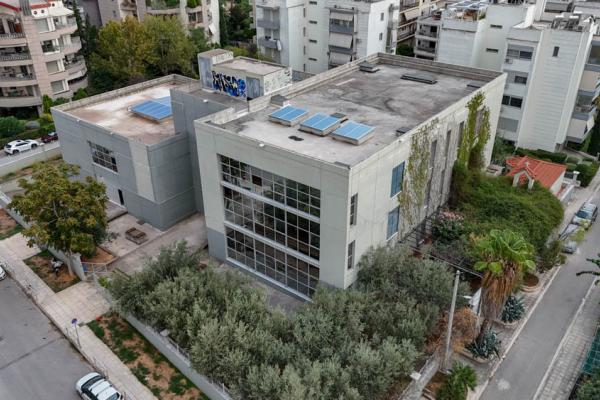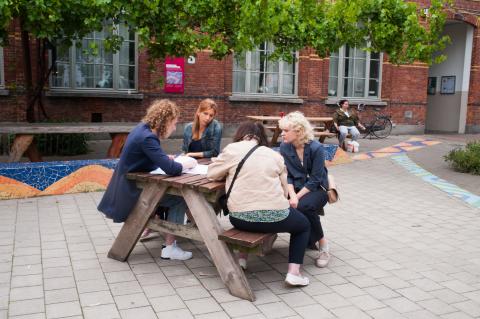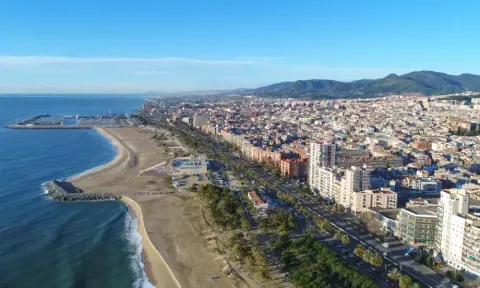
Tackling the energy transition in the housing sector: learnings from Ghent, Getafe and Mataró
Tackling the energy transition in the housing sector: learnings from Ghent, Getafe and Mataró
As we reflect on the near closure of the Innovative Actions Call 3, where Energy transition was one of the 2 topics, discussions around the affordability of this critical shift come to the forefront. The urgency of the climate crisis demands rapid action, yet the path forward—often involving costly renovations, material changes, and the adoption of new technologies—raises questions about affordability for all.
In this edition of our newsletter focusing on Housing, we wanted to explore the intersection of energy transition, and affordability in the field of housing. This isn't just a matter of professional interest but a question that resonates deeply with our collective responsibility: how can we ensure that the essential move towards a sustainable future remains within reach for everyone?
Two UIA (Urban Innovative Actions, the predecessor of EUI) projects had a very interesting approach to energy transition and housing: ICARRUS and Yes, We Rent!
In Ghent, Belgium the ICCARUS project tackles the energy transition by focusing on "captive owners"—homeowners unable to afford the necessary renovations to improve energy efficiency. Many of these individuals inherit homes or purchase them with loans but lack the resources to upgrade them, which results in increased energy poverty. Ghent’s approach combines financial support with comprehensive social and technical guidance to help these homeowners overcome the barriers to renovation.

ICCARus project - Ghent, Belgium
The city offers two renovation models: the guided renovation and the city-managed renovation. In the guided model, social workers help homeowners navigate regulations and identify funding opportunities, while technical counsellors manage the renovation logistics, including contractor hiring and supervision. The city-managed option completely relieves homeowners from the burden of overseeing the works. This approach acknowledges that financial support alone is insufficient—many vulnerable homeowners need hands-on assistance.
The project also includes a revolving fund, offering up to €30,000 per household for energy-efficient renovations. Repayments are made when the property is sold or rented, ensuring long-term sustainability for the programme. This model allows the city to reinvest in future projects, while avoiding the risk of speculative housing practices by capturing part of the added value when properties increase in worth. Temporary housing is also provided for owners during renovation works, ensuring that even the most vulnerable are supported through the energy transition.
Mataró's Yes, We Rent! project addresses the energy transition from a different angle by focusing on the city’s vacant housing stock. Mataró, like many cities, has a significant number of empty flats that could be repurposed for affordable housing while improving energy efficiency. The project encourages owners of vacant properties to renovate them and rent them out at below-market rates in exchange for financial subsidies.

Mataro, Spain
One of the most innovative aspects of the ‘Yes, We Rent!’ project is to coproduce affordable rental housing through a collaboration between the municipality and its citizens by founding a tenants’ cooperative. In animating citizens to become active agents in the provision of affordable housing, ‘Yes, We Rent!’ touches a key issue for public housing policy today.
To further support landlords, the project offers additional services, including an assessment of renovation needs, legal templates for rental contracts, and assistance in managing rental agreements. By revitalising vacant properties, Yes, We Rent! aims to increase the availability of affordable housing, reduce urban sprawl, and promote energy efficiency. This project not only brings vacant flats back into use, but also ensures they meet modern energy standards, contributing to a greener, more inclusive housing market. Furthermore, these flats have become the foundation of an affordable housing stock under the management of the tenants’ cooperative that will continue to incorporate new flats for affordable housing.
The Energy Poverty Intelligence Unit (EPIU) in Getafe, Spain is a groundbreaking initiative that addresses energy poverty—a situation affecting 20-25% of Spain’s population. Energy poverty is particularly pervasive in vulnerable groups such as low-income families, migrants, and the elderly. EPIU focuses on identifying hidden energy poverty, where households restrict energy usage due to high costs. By doing so, it ensures that no one is left behind in the energy transition.
At the core of the EPIU project is the Healthy Households Office (OHS), a one-stop shop where residents can access personalised support on energy efficiency measures. The OHS offers clear, accessible advice without technical jargon, ensuring residents can easily understand and take advantage of the available solutions. Tailored interventions include energy audits, smart sensors to monitor and reduce energy consumption, and passive cooling measures, such as thermal paint and awnings. The OHS also addresses critical issues such as supply cut management and debt issues.

Getafe, Spain
A significant feature of the project is that these solutions are offered at no upfront cost to residents, making energy-efficient upgrades accessible to low-income and vulnerable groups. The project targets households and buildings alike, implementing solutions such as whole-building rehabilitation, self-produced energy systems, and upgrades to heating facilities. By focusing on both behavioural (soft) and structural (hard) measures, EPIU ensures a comprehensive approach to the energy transition.
EPIU is particularly mindful of the challenges faced by elderly residents and those in long-term poverty, many of whom are already supported by social services. By identifying hidden energy poverty through data analytics, EPIU ensures that the needs of these groups are addressed effectively, making the energy transition more equitable and just.
Conclusion
The ICCARUS, Yes, We Rent!, and EPIU projects highlight an important reality: the energy transition, if left unattended, will deepen existing inequalities. Without collective and structural action, the burden of transitioning to sustainable energy will disproportionately fall on those who can least afford it—low-income families, the elderly, and vulnerable communities already grappling with energy poverty.
However, these projects also illustrate that targeted financial support, technical assistance, and socially just frameworks can ensure that the most marginalised are not excluded from the green transition. These projects point us in the right direction, but the fight for an equitable, sustainable future demands deeper structural change.
For further inspiration, explore other UIA projects, particularly the Vilawatt project in Viladecans, as well as our Just Transition study, with a chapter focusing on making the transition affordable for all. And stay tuned for the upcoming Call 3 projects on energy transition!